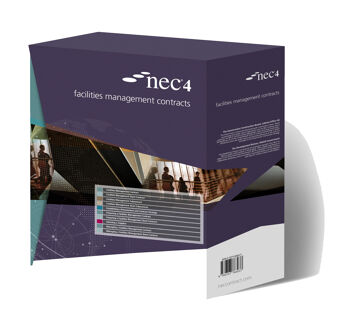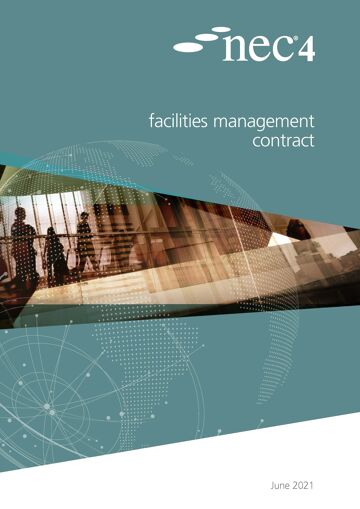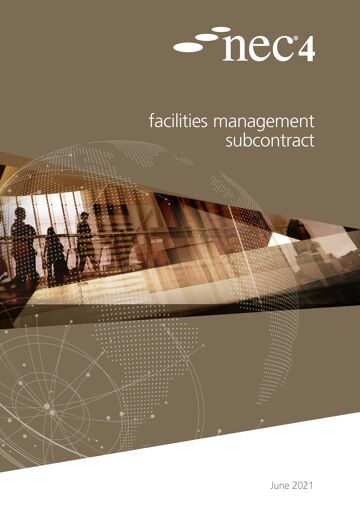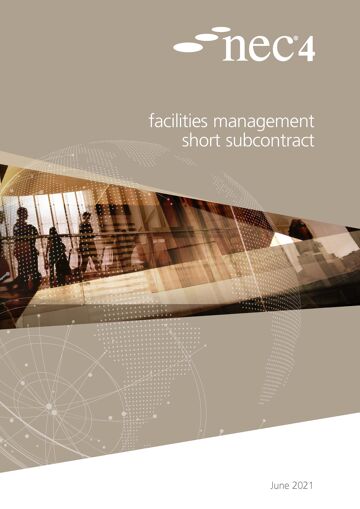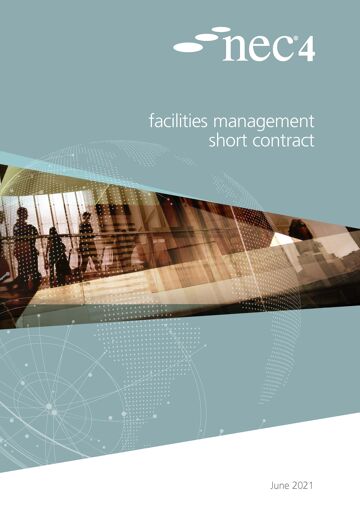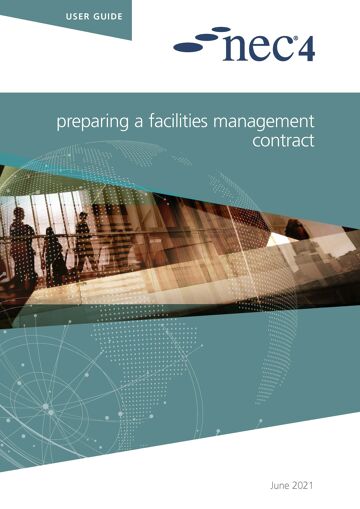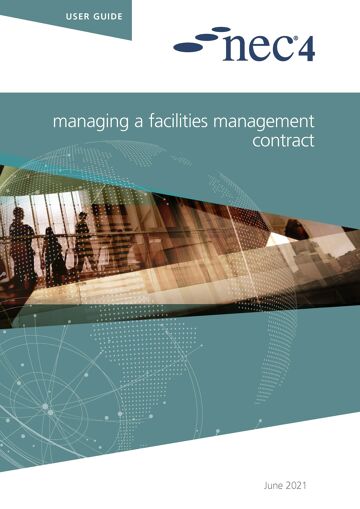Introduction to the NEC4 Facilities Management Contract (FMC)
"The FM sector typically uses bespoke contracts over a standard form. The NEC4 FM Contract has been released to encourage best practice in procurement across the FM industry, and this training will help you see the benefits of an industry standard and supported contract, while still having the flexibility to tailor the contract to your needs."
– Ross Hayes, NEC Consultant, Drafter and Trainer.
Background
The NEC4 FMC has been developed particularly for the facilities management sector, but also for those with any asset to maintain, for the appointment of a service provider for a period of time to manage and provide a service. It provides a modern method for clients, service providers and service managers to work collaboratively consistently to achieve their objectives.
People will be motivated to play their part in collaborative management if it is in their commercial and professional interest to do so. Uncertainty about what is to be done and the corresponding risks and liabilities can lead to disputes and confrontation. The FMC clearly allocates risks, and the collaborative approach will reduce those risks and uncertainty for all the parties.
This training course starts at 09:00 and finishes at 17:00 with refreshment breaks mid-morning and afternoon, plus lunch. All timings, except the start time, are approximate and may be adjusted to suit natural breaks in the lesson.
Session 1 - Overview of the NEC and the NEC4 FMC
- This session shows how NEC contracts have helped transform contractual behaviours and how the FMC works alongside other contracts in the suite.
- It covers when the FMC should be used, and its relationship to its subcontract (Facilities Management Subcontract, FMS) and the Facilities Management Short Contract (FMSC) and Short Subcontract (FMSS). Importantly it also considers how work is ordered.
Session 2 - Using the FMC
- This session covers the contract strategy; an explanation of the main and secondary Options that can be chosen and the other contract documents that need to be produced. It particularly highlights the importance of the Performance Table for setting performance targets and responding to their achievement or failure. It also outlines the difference between defined and identified terms, their significance in the contract and the Contract Data and how they should be used.
Session 3 - Managing the Contract, the FMC Processes
- 3.1 - General Provisions. This session looks at the general techniques that are used to manage the contract including mutual trust and co-operation, communications, the role of the Service Manager and Service Provider, early warnings, and Service Orders and their requirements.
- 3.2 - Service Provider's Main Responsibilities. This session outlines the Service Provider’s main responsibilities; covering how the service is provided, the Service Provider’s design, key people and subcontracting.
- 3.3 - Time. This session considers when the service starts and finishes, the importance of the plan, and how the Accepted Plan is used and revised to help manage delivery. It also considers mobilisation and demobilisation plans.
- 3.4 - Quality Management. This session clarifies how service failure is identified and managed throughout the Service Period.
- 3.5 - Payment. This session covers how amounts for payments are calculated and how handling costs can vary with the main Options. It includes when payments should be made as well as Disallowed Costs and the two Schedules of Cost Components.
- 3.6 - Compensation Events. This session gives an overview of what compensation events are and how they should be managed to ensure neutral cost to the Service Provider and transparency and fairness to the Client.
- 3.7 - Use of Equipment, Plant, and Materials. This section will review how title for equipment, and Plant and Materials passes between the Parties, particularly at the end of the Service Period, and the relevance of Service Areas.
- 3.8 - Liabilities and Insurance. This session looks at the way the contract deals with liabilities and maintains a risk profile which complies with the overarching NEC principle of mutual trust.
- 3.9 - Termination and Dispute Resolution. This session deals with the process of termination and the reasons why the termination process can be invoked, along with the various dispute resolution procedures.
Session 4 - Project Orders
- As an Option, the FMC includes Projects to allow the Client to instruct small pieces of work where the complexity and interaction with the Client’s normal working requires a detailed programme. This session examines how these are instructed and managed.
Session 5 - Summary and Open Forum
The eLearning follows the same structure as the one-day tutor-led course, distilling the key information into approximately 5 hours and 30 minutes of content. The length of time taken varies depending on how quickly individuals study and absorb the material.
Session 1 - Overview of the NEC and the NEC4 FMC
- This session shows how NEC contracts have helped transform contractual behaviours and how the FMC works alongside other contracts in the suite.
- It covers when the FMC should be used, and its relationship to its subcontract (Facilities Management Subcontract, FMS) and the Facilities Management Short Contract (FMSC) and Short Subcontract (FMSS). Importantly it also considers how work is ordered.
Session 2 - Using the FMC
- This session covers the contract strategy; an explanation of the main and secondary Options that can be chosen and the other contract documents that need to be produced. It particularly highlights the importance of the Performance Table for setting performance targets and responding to their achievement or failure. It also outlines the difference between defined and identified terms, their significance in the contract and the Contract Data and how they should be used.
Session 3 - Managing the Contract, the FMC Processes
- 3.1 - General Provisions. This session looks at the general techniques that are used to manage the contract including mutual trust and co-operation, communications, the role of the Service Manager and Service Provider, early warnings, and Service Orders and their requirements.
- 3.2 - Service Provider's Main Responsibilities. This session outlines the Service Provider’s main responsibilities; covering how the service is provided, the Service Provider’s design, key people and subcontracting.
- 3.3 - Time. This session considers when the service starts and finishes, the importance of the plan, and how the Accepted Plan is used and revised to help manage delivery. It also considers mobilisation and demobilisation plans.
- 3.4 - Quality Management. This session clarifies how service failure is identified and managed throughout the Service Period.
- 3.5 - Payment. This session covers how amounts for payments are calculated and how handling costs can vary with the main Options. It includes when payments should be made as well as Disallowed Costs and the two Schedules of Cost Components.
- 3.6 - Compensation Events. This session gives an overview of what compensation events are and how they should be managed to ensure neutral cost to the Service Provider and transparency and fairness to the Client.
- 3.7 - Use of Equipment, Plant, and Materials. This section will review how title for equipment, and Plant and Materials passes between the Parties, particularly at the end of the Service Period, and the relevance of Service Areas.
- 3.8 - Liabilities and Insurance. This session looks at the way the contract deals with liabilities and maintains a risk profile which complies with the overarching NEC principle of mutual trust.
- 3.9 - Termination and Dispute Resolution. This session deals with the process of termination and the reasons why the termination process can be invoked, along with the various dispute resolution procedures.
Duration
Approximately 5 hours and 30 minutes.
The length of time taken varies depending on how quickly individuals study and absorb the material.
Please note that the licence is valid for 6 months only from date of purchase.
This course is designed for those working with or considering using the FMC form including:
- Service managers
- Clients
- Facilities managers
- Consultants
- Service providers and their supply chain.
It is designed for those with minimal experience with NEC contracts or the FMC form but can be beneficial to those wishing to recap their knowledge.
Virtual Training
Product code: L46316
Online
Product code: L47527



